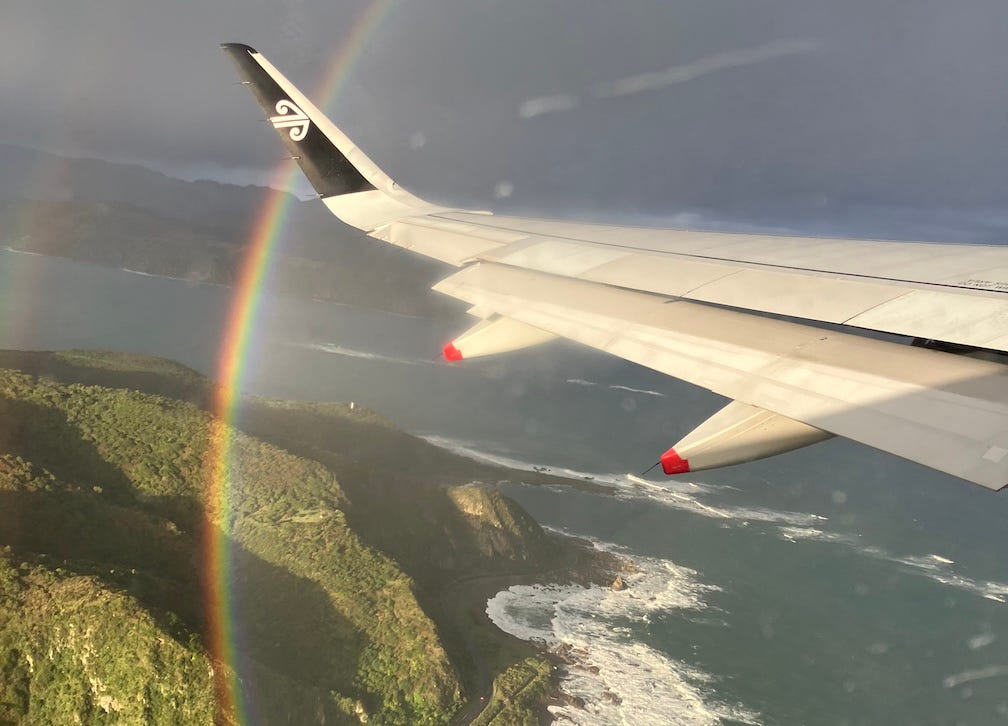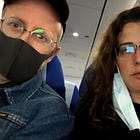Should You Move to New Zealand?
On the joys of Kiwi smalltalk, backcountry huts, and wearing jackets inside
Welcome to american.nz! I write a weekly letter on the NZ/US exchange, and the joys and pains of gringo life abroad. Subscribe for free to receive it directly in your inbox.
Something a little different this week! I’ve done an interview with Elizabeth at Elizabeth.Ink about my family’s life in New Zealand, and I’m sharing it below.
Elizabeth, an American living in Switzerland, is best known in these parts for her essay “Europe Won’t Fix You,” which pushes back on the broadly aspirational tone of Substack’s expat conversation. She’s now running a great series called Should You Move, in which leavers around the world take a survey about our lives abroad.
I volunteered on a lark, and found the process more intense than I’d planned for! Can’t imagine why. When was the last time any of us, home or away, sat down to bang out a public State of the Nation about our lives?
Big thanks to Elizabeth for having me! Her original post is here. Hope you enjoy.
Should You Move to New Zealand?
Insights and reflections from people who’ve done it: Wairarapa edition
Elizabeth: Buckle up, kids, because, on this edition of Should You Move, we’re headed to tiny yet mighty New Zealand: clean, beautiful, stable, a haven for Hobbits and hikers alike. What’s not to love? Let’s find out…
In his thoughtful response, Dan Keane from american.nz shares how life changed when he moved from China to New Zealand with his young family for what was supposed to be a temporary stay, but the pandemic had other plans for them.
Dan Keane, New Zealand
1. Background:
Country of origin: USA
Country of current residence: New Zealand
Length of time living abroad: We’re 11 years abroad now. From 2013 to 2020, we lived in China. Since 2020, we’ve lived in New Zealand.
2. Motivation: What was the primary reason for your move? (e.g., work, study, retirement, lifestyle):
Our move to China in 2013, as two kids fresh out of grad school, was for work and adventure. Our move from China to New Zealand in 2020, now married with two little ones, was more complicated. As the pandemic began, the university where we taught advised faculty to leave Shanghai and shelter in place somewhere else. We flew to NZ because my partner’s sister lived here, and we’d visited once and really liked it. We thought we’d be back. We didn’t even bring the kids’ car seats with us. We landed here on January 28, 2020, and five days later, NZ closed the border to travelers from China. Then the pandemic went global…and we just stayed.
3. Practicalities:
How challenging was the visa and work permit process?
Ours was pretty straightforward. We came in on tourist visas, and then my partner was accepted to a PhD program, and her student visa carried the whole family. I was allowed to work, and the kids were allowed to go to school. I eventually started a PhD myself. It’s been frustrating, though, that our student visas have no direct path to residency or citizenship. I know foreigners who’ve been here less time than we have and who are much farther along. If you move to NZ, get that work visa ASAP!
What were the biggest hurdles in setting up your life abroad (e.g., housing, healthcare, banking)?
Housing is tricky. Foreigners are not allowed to buy property, at least for now, and the rental market is tight and often poor in quality. We’ve lucked into a beautiful place in the Wairarapa, a lovely valley outside Wellington. We’ve got a yard full of bees and roses. If we stay long-term, we’ll have to ‘get on the property ladder,’ as they say here. New Zealand is, if anything, even more obsessed with home ownership than the United States. Kiwi journalist and substacker Bernard Hickey has famously called the entire national economy ‘a housing market with bits tacked on.’ For now, at least, we’re living in the bits.
4. Cultural Adaptation:
What were the most significant cultural adjustments you had to make?
It’s a pretty easy adjustment for a white American dude like me. Hell, I’m mostly a mix of UK and Irish stock, which, on the long arc of history, makes me family to most Pākehā here. There’s that word, which I love: Pākehā is the te reo Māori term for New Zealander of European descent. Read that one again, Americans: New Zealand’s white settler majority has (mostly) adopted a Māori word to describe itself. My cowboy head spins! The politics and vibes here are fascinating. I’m still working out how to narrate my own story here and that of my Kiwi-raised kids who’ve grown up singing Māori songs in school. But I’m learning, and I love the energy that this country devotes to such a complicated conversation. (As it happens, the current government seems bent on squashing that conservation.)
How did you handle language barriers and cultural misunderstandings?
There’s no language barrier, but that doesn’t mean things don’t get weird sometimes! Kiwis generally talk more quietly than Americans, and the accent and slang can still throw me. (‘Rellies’ for relatives??) Kiwis also do loads more small talk, are more comfortable with pauses, and avoid gushy farewells. These are big changes for an American raised on hugs, loud self-deprecation, and a total abhorrence of silence! In making friends here, I’ve learned to dance to the local rhythms and, eventually, to just breathe out and let my American freak flag fly. With strangers, I will simply agree that it’s hot out there today, even when I’ve got a spare jacket in the car (and it’s never Arizona hot, and I’ve always got a spare jacket in the car.)
5. Quality of Life:
How would you rate your overall quality of life compared to the US?
‘Quality of life’ has such an American consumerist ring to my ears, like I’m rating my whole life on Amazon. To my eyes, NZ’s built environment can often feel smaller, simpler, shabbier, and more expensive for lower quality—but lower quality than what? A mall in Dallas? What do you really need? When my family visited us here, they told me, joking but not: ‘One day you’ll live in a country where you don’t have to wear a jacket inside.’ Maybe. It’s not a priority. Here, I’ve got the air, the light, the green, the quiet, the stars. This week, we’re joining some friends for an overnight hike to a backcountry hut in the Tararuas. Nine miles over two days, up and down a mountain river. No electricity, no cell service, and one drop toilet out at the hut. The kids are all between six and eight, they’ve all done hikes like this before, and they’re stoked! There will be tired legs, hot chocolate, and a long summer twilight throwing rocks in the river. Quality, all of it.
Are you satisfied with the cost of living, healthcare, and education systems in your host country?
Talking cost per quality should feel even more consumerist, but money is concrete in a way that quality is not. Hard truths here: NZ’s cost of living is high and the wages are low. A record number of Kiwis left in the last year, seeking higher pay and lower costs elsewhere (Australia, mostly.) As a fellow immigrant told me once: ‘You don’t come to New Zealand to get rich.’ We mostly feel the pinch in food and consumer goods, which have all gone up considerably. Gas is more expensive than the US but that’s true all over the world. Healthcare is free if you’re a resident, though the public system is struggling after years of underinvestment. As students, we pay for health insurance. Our kids’ school is public and free, and we pay a small annual fee to send them to the school’s Montessori program. Are we satisfied with the costs of all this? For now, yeah. Next question.
6. Professional Experience:
How has living abroad impacted your career?
Moving abroad began a career and then ended it. The move to China got me into university teaching, and the move to NZ pulled me right back out. In truth, we’d started planning our Shanghai exit anyway, and aimed to hole up somewhere quiet and write awhile. As a dual PhD household, I think we’ve checked that box! What comes next, though, I don’t know.
Were you able to find employment easily?
Mixed results. I kept my China job for three semesters after landing here, teaching all online. Then I found a great job with the local libraries, but that was mostly funded through a pandemic-era grant that didn’t continue (fixed-term employment is a common thing here, especially in government jobs.) I’m lucky to have a fellowship for the PhD, so that’s technically a job, ain’t it? I love the work I’m doing—I’m researching expat writers on Substack, as a matter of fact. When that wraps in another year or so, I’ll be facing a brutal job market here. NZ’s conservative government has laid off a ton of government workers, and Wellington’s white-collar labor market is now a writhing heap of desperate bodies. Substack’s been a good way to network here, actually. Something will come eventually, here or back in the States. We’ll see.
7. Advice for Future Expats:
What are the top three things you wish you knew before moving abroad?
Skip the storage unit. Or do like I did last year, and burn three days of your visit home throwing out books I boxed up twenty years before and fighting a tightness in my chest that wasn’t just the dust.
When in Rome…The locals don’t need to ship stuff from America, so you don’t either…at first. In time you’ll figure out the indulgences you truly can’t do without.
Pack Nyquil. American drugs are still the best drugs.
What advice would you give to someone considering a similar move?
For the parents and parents-to-be: Kids are not expats. Little ones, anyhow. Expat is a loaded word, for sure, but to me, it means the privilege of building a mental framework that holds you just a bit outside the country you live in (instead of, or alongside, the framework a country imposes on you). It’s a wild sort of mental practice, at once elegantly cosmopolitan and indefensibly selfish (like being a writer, in many ways.) But little kids—ours were three and fifteen months when we landed—simply can’t do this. They’re all in on the life right in front of them. They’re immigrants, or even simply locals, embodying identities that I’ve danced around for years. Or they were, anyhow. They learn quickly. Our son now says he’s an American. Our daughter leans Kiwi but is keeping her options open. In the end, I suppose, they will lead and our hearts will follow.
8. Overall Experience:
Looking back, would you say moving abroad was a positive experience? Why or why not?
Yes! I’ve seen a nice little chunk of the world, I have, and not as a tourist, either! This was something I wanted deeply from a pretty young age. Needed, really, for reasons I still can’t explain. On the longest narrative arc, I don’t separate my life in NZ from my life in China, or from previous lives and years and seasons in Bolivia, Mexico, Honduras, and Paraguay, or that one odd semester in the UAE. It’s just the world, man. I love it so. Sometimes, I feel like my life’s main goal is to be Rutger Hauer at the end of Blade Runner: I’ve seen things you people wouldn’t believe…Kiwi country meeting halls off the shoulder of Orion… But, of course, his character is a replicant. Not actually a human at all. Hmm.
9. Additional Comments:
It’s breezy here in NZ today. All our windows are open, so the inside doors are both swinging open and slamming shut. There’s your trusty metaphor: one door opens, another closes, and sometimes the wind will do it for you. Standard middle-aged wisdom, I know. But to move abroad is to turn sharply down an entirely new hallway. You might get lost, but who knows what you’re going to find. Godspeed, y’all.
If you loved this as much as I did, you can find lots more from Dan at american.nz where he writes about hiking, raising a family, getting his doctorate and doing it all on the “wrong” side of the road. //
More on how we got here, and why we stay:









I'm interested in the question Elizabeth *doesn't* ask her interviewees, namely why would NZ (or any of other countries) want to have you? What do you bring to the country that means you're not just exploiting it for your own gain as so many colonists have done before you?
Awesome Dan. I laughed out loud at let American Freak flag fly. I liked the pure honesty in this piece of your experiences here.